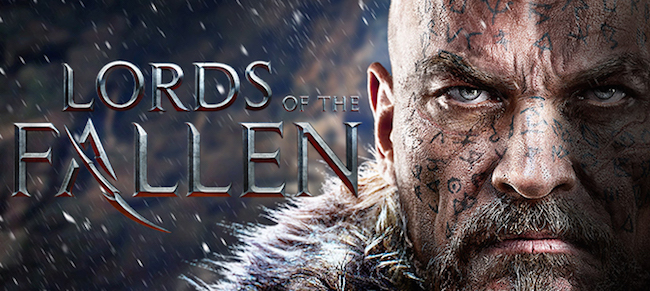
As someone who regularly plays a lot of different games, I’ve started to become frustrated with poor design choices that needlessly waste my time. I really don’t enjoy trivial objectives that fail to engage players in a meaningful way, or, at the very least, provide an opportunity for advancement or character development. For example, I don’t enjoy following way points or wasting hours grinding away for XP. Give me a map and let me work out where I need to go, and if I need to be a certain level to beat a boss, provide me with engaging opportunities to get stronger. Whether it’s as simple as making choices in The Walking Dead or as deeply challenging as mastering the combat in Dark Souls, I want to know my time investment isn’t superfluous. I enjoy games that want to engage me, regardless of the method.
Lords of the Fallen is one of these games. It doesn’t want to hold your hand, and even goes as far as to demand you take the time to understand its mechanics. It may sound exhausting, but this is actually the type of masochistic experience I crave sometimes, as I appreciate the fact that I can proceed as quickly as my skill allows me. It’s why I adore the Souls series so much, and, in this case, it’s as clear as day that the teams at Deck13 and CI Games are huge fans of those games too as there are a lot of parallels that can be drawn between the two. Basically, Lords of the Fallen promises to challenge players, but not in a way that feels unfair or frustrating. The developers want players to feel the satisfaction that comes from mastering the combat – which is all the convincing I needed to pick up the game.
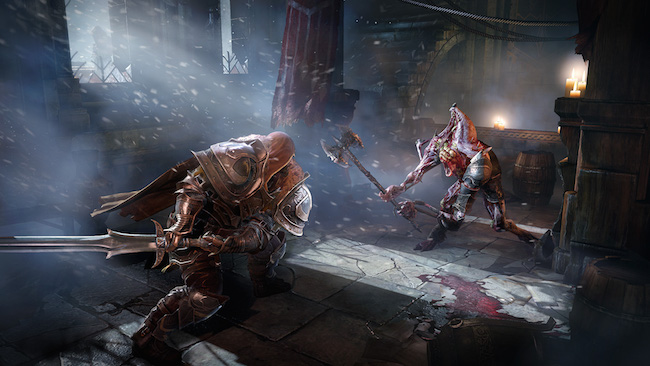
Lords of the Fallen centres around an anti-hero called Harkyn, who is regarded as the worst criminal within the human realm. While his crimes are never directly stated in the game, he does have runic tattoos all over his face which are meant to represent his sins. Basically, the premise is that eight thousand years ago, the people defeated a god known as “The Fallen,” who has laid dormant until recently. All of a sudden, however, the generals of his demonic army, or “Lords” as they’re called, have been flooding into the human world with their soldiers (the “Rhogar”) to take revenge. This is where Harkyn comes into the picture, being released from captivity as the leaders of humanity have grown increasingly desperate. It is now up to him to defeat the Lords in atonement, and to uncover the mystery of The Fallen.
As a premise, it works well enough to drive the game forward; which, in itself, is satisfactory. However, rarely does the exposition or dialogue grow compelling enough to make you genuinely care about the people you’re supposed to be saving. You can interact with characters using limited dialogue options, but every conversation has an incongruent feeling to it. I was always aware I was talking with a scripted NPC, and so I struggled to empathise with anyone as a result. The game exists within an awkward state of storytelling, where it could have been successful if it pulled back or it took it one step further. It has moments towards the end where it almost breaks from mediocrity, but no matter how I look at it, I can’t help but feel there was a missed opportunity to develop Harkyn into a far more relatable protagonist.
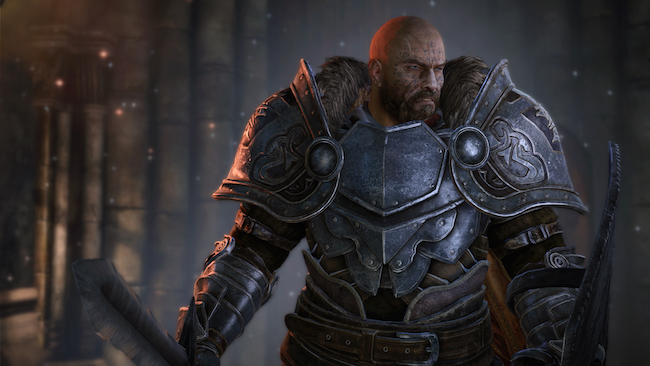
While the core narrative struggled, I think it’s fair to say the world design was handled a little better. The diversity in the environment isn’t filled with as much variety as some other roleplaying games, but it does establish it’s visual presence quite prominently. In many ways, it reminded me of the Vikings TV series, albeit mixed together with a vibrant gothic fantasy. I was genuinely interested while exploring my surroundings, and even found the collectable scrolls and item descriptions to be quite complimenting to my interest in the world. In turn, the graphics of the game capture the artist’s vision well, with some particularly impressive lighting and weather effects that add another layer of immersion.
Where the art style excels, however, is with the visual design of the armour, equipment and weaponry. Lords of the Fallen clearly wants the player to feel like a badass, and this is a tone that’s carried on throughout the rest of the game, with some really great looking demons too – even if the variety is a bit lacking. There was also some really notable music composed for the game; with the main theme standing out in particular. I don’t know if it was just the preview build, but I also experienced some weird bugs with missing audio layers, as well as a few visual glitches on occasion too. That’s not even taking into account the absolutely atrocious lip-synching which could rival a ’90s anime.
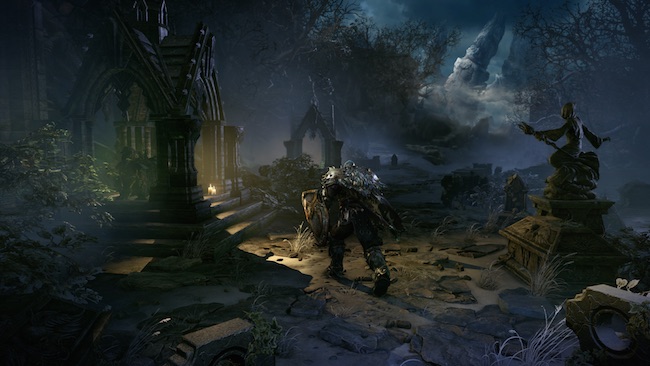
As mentioned earlier, the game takes a lot of influence from the Souls series. In fact, to a point where the combat controls are practically identical, experience must be recovered from your point of death, special way points exist where you can rest at to recover your health and potions, and you play in an open-styled world that’s filled with hidden treasures and shortcuts to discover. The core difference between Lords and Souls, however, is that this game is a lot more forgiving; which was a relief as its combat mechanics aren’t nearly as flawless as the aforementioned. While, in a similar fashion to Souls, the player drops their experience when they die, you can actually bank experience at crystals (checkpoints) without penalty. The game alternatively offers a risk/reward system, where if you avoid using a crystal, you gain an XP multiplier for each enemy killed. Personally, I thought this was a great variation on the Souls formula.
In the beginning, you have the option of several classes, as well as specialising in one of three magic styles. This decision is important as it cannot be changed, and will certainly affect the way you play. Personally, I went for a cleric (specialised in magic), with a focus in stealth spells. What I learned quickly from this combination, is that for as similar the game feels like a Souls game, the strategy to combat is totally different; with a lot more environmental factors coming into play. The balancing is very odd too, with my class having pathetically powerful advantages over some enemies, and being ridiculously vulnerable to others. Further research showed that a variation of the warrior class gets so powerful that it takes away all the challenge by the end. Regardless, the combat is still solid, I just expect to see some really mixed reactions in regards to the difficulty of the game. For my class, some bosses were extremely tough!
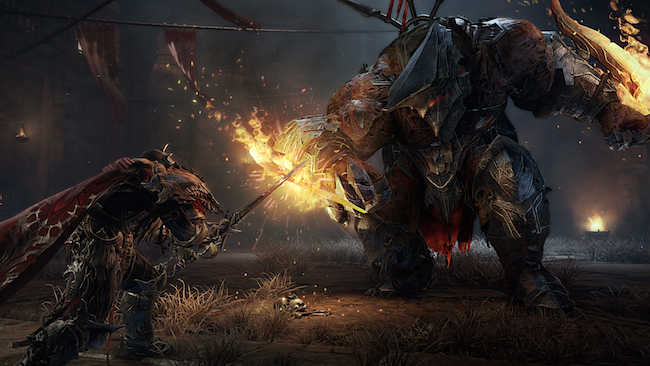
With that said, loot is the name of the game in Lords of the Fallen, and this is something it does especially well. As I mentioned earlier, I don’t appreciate games that needlessly waste my time, and what I enjoyed most about this game is that there were so many different ways to strategise or improve your character build. For example, you could go a direct route, and brawl your way through difficult areas without using a crystal to increase your XP and rewards; or you could focus on unlocking runes to customise your equipment to be more effective against a particular enemy type. There are also various challenge zones which unlock after defeating a boss, as well as a variety of side-quests which are nearly always incentivised with unique rewards. At times, it was even just about trial and error, and learning the behaviour of a boss in order to defeat them. Whatever your preferred method, the way to success is solely up to you.
Sometimes taking too much of a step back isn’t necessarily beneficial, though. Personally, I respect that the game doesn’t provide the player with objective way points; in fact, it often encourages exploration. However, I really would have appreciated a map that I could reference, as well as something that could help me keep track of side-quests. There is a difference between not holding the player’s hand and disempowerment, and the latter is definitely not something you want in a hack-and-slash RPG. Dark Souls works a little differently as its world is so diverse, that it’s much easier to familiarise yourself with it’s locations; whereas a lot of Lords of the Fallen looks visually similar. Without a map, it can be very difficult to rediscover where you’ve been, and this is something I personally found annoying and time wasting. I don’t want to see players being spoon fed, but it’s also not great to withhold our basic tools to do that.
 Fantastic visual art style and audio design
Fantastic visual art style and audio design
 A refreshing take on the core Souls formula
A refreshing take on the core Souls formula
 Engages the player with a lot of options
Engages the player with a lot of options
 Strategy is an important factor in combat
Strategy is an important factor in combat
 Lots of optional content to be discovered
Lots of optional content to be discovered
 Narrative was not consistent or compelling
Narrative was not consistent or compelling
 Audio/visual bugs and bad lip-synching
Audio/visual bugs and bad lip-synching
 The difficulty suffers from poor balancing
The difficulty suffers from poor balancing
 Navigation can be annoying without a map
Navigation can be annoying without a map
Lords of the Fallen is a game that successfully builds upon existing ideas, while still managing to create an identity for itself. There is a lot for Deck13 and CI Games to be proud of here, as they’ve created a visually defined experience that provides players with an incredible amount of agency and replayability. I respect that this is a game that expects players to figure it out, and to approach each battle with a unique strategy and build configuration; even if a few more tools would have been handy. However, as rewarding as the gameplay mechanics can be at times, there are noticible balancing issues across every class. Essentially, you’re going to have to put up with some teething issues, but for those too intimidated by Dark Souls, Lords of the Fallen is a good place to start. The foundation for greatness is here!











